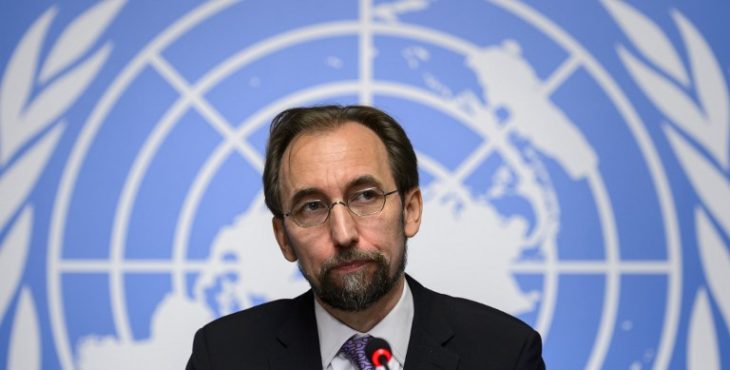European Foundation for South Asian Studies (EFSAS), a European think tank, has questioned the credibility and neutrality of a recent report on Kashmir prepared and published by High Commissioner for Human Rights Zeid Ra’ad Al Hussein. The think tank stated that the report ‘displays a pronounced pro-Pakistan bias’ with regard to the human rights situation on both sides of the Line of Control (LoC). It has also accused Al Hussein for ‘being unfairly and unreasonably critical of India’s human rights record’. Al Hussein was recently photographed with members of the Hurriyat Conference as well as the ISI.
#BREAKING: UN Human Rights High Commissioner who wrote UN Kashmir report, Zeid Ra’ad Al Hussein, seen posing with radical Hurriyat separatists and Pakistan ISI agents in Geneva, hours after the report published. Ghost writers of UN Kashmir report from Pak ISI. India slams UN HRC. pic.twitter.com/uvLVX4UE13
— Aditya Raj Kaul (@AdityaRajKaul) June 20, 2018
The EFSAS has found that the Kashmir report is factually incorrect and has used wrong terminology contrary to what the United Nations has generally agreed on. For instance, Al Hussein has referred to terrorist organisations like the Hizbul Mujahideen as ‘armed outfits’, despite the fact that Hizbul is designated as a terrorist organistion in the United States, the European Union and India. The author has regularly described as ‘armed groups’ the several outfits active in Kashmir such as Lashkar-e-Taiba, Jaish-eMohammed and Harakat Ul-Mujahidin, which are already included in the U N Security Council’s banned or sanctioned list. The Kashmir report has also regularly described PoK as Azad Kashmir, which the United Nations officially refers to as Pakistan Administered Kashmir. The EFSAS states that the usage of terms popularly used in Pakistan such as Azad Kashmir reflect the author’s Pro Pakistan bias.
The interesting aspect in the Kashmir report is that it has covered events over just two years, starting from the time when militant Burhan Wani was killed in an encounter in the Valley. The EFSAS stated that this clearly shows the predisposition of the author, and puts his motives out in the open. Not only is the report prepared largely from secondary sources, as admitted by Al Hussien, but also concentrates only on the Indian side of the border, painting a false picture of Human Rights violations by Indian authorities.
The EFSAS found that the biggest omission in the report, and hence the biggest indicator of its lack of credibility, is the complete ignorance of Pakistan sponsored terrorism and insurgency activities. It is an open secret now that Pakistan has been creating, funding and training militants on its side of the border to disturb the law and order situation in Jammu and Kashmir and commit terror activities there and in other regions of India. What started off as a state practice to prevent normalcy to return to everyday life in the Valley, has gone on unabated for the last three decades or so.
The European think tank claims that the report as well as its author are in complete disregard for the United Nations by ignoring the vast amount of information available to the Al Hussein at UNHRC sessions. By ignoring the data available from the UNHRC itself, and choosing secondary sources to suit his own narrative, Al Hussein has disrespected the United Nations and its conventions.
The UNHRC was in the headlines last week as Donald Trump decided to withdraw the United States from the UN body, citing a clear ‘anti-Israel bias’ within the UN body. As noted in a previous article, the UNHRC is ironically chaired by Saudi Arabia, which has arguably the worst Human Rights record in the world today. Donald Trump’s withdrawal on the basis of a bias and lack of neutrality, coupled with EFSAS calling out the Kashmir report as blatantly biased to Pakistan, can only signify that the UNHRC is a toothless organisation, with little to no effect on the ground reality. As of now, it seems to be used to twist or build narratives, depending on who is in a position of power within the UN body.
